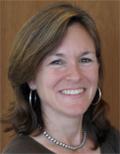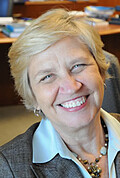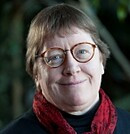On Wednesday, September 13, CHE-Alaska hosted a call about proposed drastic cuts to EPA's budget and the potential harm to human health and the environment.
Right now, the Environmental Protection Agency (EPA) is facing devastating budget cuts that threaten our drinking water, clean air and public health. Join this call to learn about the EPA’s mandate to protect public health and the environment, the unprecedented attack on the role of science in regulating chemicals and pollution, and the potential harm to vulnerable populations and community health. Find out why no one stands to lose more than Alaskans – especially rural Alaskans – if the President’s proposal for drastic cuts to EPA’s budget are approved.
Featured Speakers
 Tracey Woodruff, PhD, MPH is Professor in the Department of Obstetrics, Gynecology, and Reproductive Sciences and Philip R Lee Institute for Health Policy Studies at the University of California, San Francisco and the Director of the Program on Reproductive Health and the Environment. She has done extensive research and policy development on environmental health issues, with a particular emphasis on early-life development. Her research include evaluating prenatal exposures to environmental chemicals and related adverse pregnancy outcomes, and characterizing developmental risks. She has authored numerous scientific publications and book chapters, and has been quoted widely in the press, including USA Today, the San Francisco Chronicle, and WebMD. She was previously at the US EPA, where she was a senior scientist and policy advisor in the Office of Policy, and author of numerous government documents. She is an Associate Editor of Environmental Health Perspectives. She was appointed by the governor of California in 2012 to the Science Advisory Board of the Developmental and Reproductive Toxicant (DART) Identification Committee.
Tracey Woodruff, PhD, MPH is Professor in the Department of Obstetrics, Gynecology, and Reproductive Sciences and Philip R Lee Institute for Health Policy Studies at the University of California, San Francisco and the Director of the Program on Reproductive Health and the Environment. She has done extensive research and policy development on environmental health issues, with a particular emphasis on early-life development. Her research include evaluating prenatal exposures to environmental chemicals and related adverse pregnancy outcomes, and characterizing developmental risks. She has authored numerous scientific publications and book chapters, and has been quoted widely in the press, including USA Today, the San Francisco Chronicle, and WebMD. She was previously at the US EPA, where she was a senior scientist and policy advisor in the Office of Policy, and author of numerous government documents. She is an Associate Editor of Environmental Health Perspectives. She was appointed by the governor of California in 2012 to the Science Advisory Board of the Developmental and Reproductive Toxicant (DART) Identification Committee.
 Linda McCauley RN, PhD, FAAN, FAAOHN is Dean and Professor at the Nell Hodgson Woodruff School of Nursing. McCauley is a national leader in the area of research on environmental exposures and conducts interdisciplinary research using participatory research models to study pesticide exposures among minority communities. Her work aims to identify culturally appropriate interventions to decrease the impact of environmental and occupational health hazards in vulnerable populations, including workers and young children. A major goal of her research is to disseminate findings in ways that are understandable and meaningful to clinicians and migrant farm workers. Her research program has been funded by the National Institutes of Health and the Centers for Disease Control and Prevention. McCauley also is a member of the Institute of Medicine of the National Academy of Sciences.
Linda McCauley RN, PhD, FAAN, FAAOHN is Dean and Professor at the Nell Hodgson Woodruff School of Nursing. McCauley is a national leader in the area of research on environmental exposures and conducts interdisciplinary research using participatory research models to study pesticide exposures among minority communities. Her work aims to identify culturally appropriate interventions to decrease the impact of environmental and occupational health hazards in vulnerable populations, including workers and young children. A major goal of her research is to disseminate findings in ways that are understandable and meaningful to clinicians and migrant farm workers. Her research program has been funded by the National Institutes of Health and the Centers for Disease Control and Prevention. McCauley also is a member of the Institute of Medicine of the National Academy of Sciences.
 Pamela K. Miller is Founder and Executive Director of Alaska Community Action on Toxics. Since 2000, ACAT has been awarded multiple federal grants for which Pam has been serving as team leader and, from 2005 through 2016, as Principal Investigator of a research team that includes faculty from four universities in Alaska and New York. These research projects rely on collaborative efforts with tribes in Alaska to address environmental health and justice issues. Pam is a leader in Coming Clean, a national network of groups concerned about chemicals policy reform, and in the Collaborative on Health and the Environment, an international partnership committed to strengthening the scientific and public dialogue on environmental factors linked to chronic disease and disability. She is one of the world’s foremost experts concerning the toxic pesticide lindane, serving two governmental organizations (United Nations and the North American Commission for Environmental Cooperation) to address international concerns about lindane. She was instrumental in prompting the 2006 decision by the US Environmental Protection Agency to withdraw agricultural products containing lindane from the US, the 2010 decision by the same agency to phase out uses of endosulfan, and the 2011 decision by the United Nations Environment Programme to ban endosulfan worldwide under the Stockholm Convention on Persistent Organic Pollutants. In 2012, she was elected as the only American on the Steering Committee for the International POPs Elimination Network. Pam is known for her work to prompt state, national, and international chemicals policy reform to protect environmental and human health in the Arctic.
Pamela K. Miller is Founder and Executive Director of Alaska Community Action on Toxics. Since 2000, ACAT has been awarded multiple federal grants for which Pam has been serving as team leader and, from 2005 through 2016, as Principal Investigator of a research team that includes faculty from four universities in Alaska and New York. These research projects rely on collaborative efforts with tribes in Alaska to address environmental health and justice issues. Pam is a leader in Coming Clean, a national network of groups concerned about chemicals policy reform, and in the Collaborative on Health and the Environment, an international partnership committed to strengthening the scientific and public dialogue on environmental factors linked to chronic disease and disability. She is one of the world’s foremost experts concerning the toxic pesticide lindane, serving two governmental organizations (United Nations and the North American Commission for Environmental Cooperation) to address international concerns about lindane. She was instrumental in prompting the 2006 decision by the US Environmental Protection Agency to withdraw agricultural products containing lindane from the US, the 2010 decision by the same agency to phase out uses of endosulfan, and the 2011 decision by the United Nations Environment Programme to ban endosulfan worldwide under the Stockholm Convention on Persistent Organic Pollutants. In 2012, she was elected as the only American on the Steering Committee for the International POPs Elimination Network. Pam is known for her work to prompt state, national, and international chemicals policy reform to protect environmental and human health in the Arctic.
This call was hosted by the CHE-Alaska Partnership. It lasted for 60 minutes and was recorded for the call and webinar archive.
